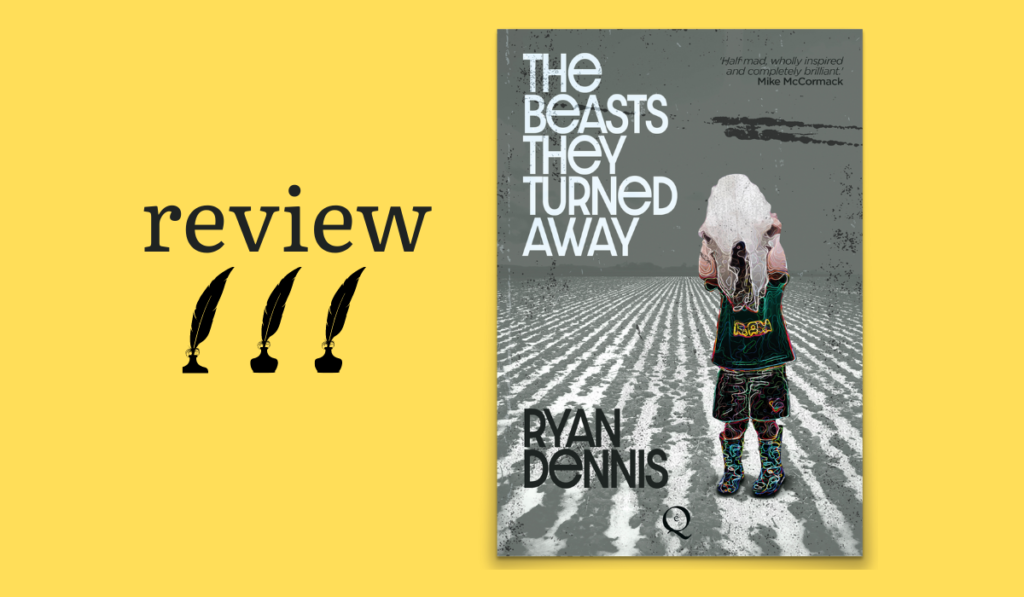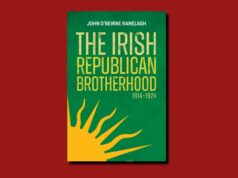
The Beasts They Turned Away|Ryan Dennis|Epoque press|9781999896089
by Eoghan Smith
The Beasts They Turned Away, Ryan Dennis’s hypnotic, unsettling debut, is a peculiar story set in an inward-looking farming community in the west of Ireland.
At the centre of this frequently brutal and violent story is the relationship between a mute, nameless young boy of unknown origin – oddly known only as ‘the child’ – and Íosac Mulgannon, a surly, stubborn old farmer who uses a hurley to stabilise his walk, to whoosh and bat his herd of cows, and to menace and, sometimes, beat those who threaten to take either his farm or the boy away. The side-eyed, paranoid troupe of locals, whipped up by a foul-mouthed, apocalyptic priest, believe the inscrutable boy to be cursed, though how this cursedness is manifested is never quite articulated. All the while Mulgannon, ‘a man called to stand’, is at war with his various enemies: hawkish neighbours, circling creditors, unfeeling bureaucrats, the modern world itself, and his own past.
The rural Ireland Dennis depicts is one where cruelty to both humans and animals is in the common run of things, where bizarre superstition maintains, and where sudden and shocking viciousness can break out at any moment.
It is foremost a place of hard, resentful men who know only physical toil and the little reward it brings. Women are largely absent and those that are present play no meaningful role, though it is indicated that Mulgannon has been calcified into bachelorhood through his rejection of love decades ago. This hyper-masculine, or perhaps, rather, de-feminised world, is at times unpleasant and vicious, a place where ‘the dark thing’ is coming for everyone.
There is, to be sure, decidedly nothing bucolic about Dennis’s portrayal of the countryside, and one might say that The Beasts They Turned Away lies within a tradition of Irish writing about the choking insularity of rural life. Replete with spitefulness, rivalries, and sexual frustration, the book echoes earlier writers such as J.M Synge and Patrick Kavanagh.
Dennis’ novel is also perhaps a more recent descendent of what has been termed ‘black pastoral’, Nicholas Grene’s phrase for the dark and warped dramas of rural Ireland depicted in the work of writers such as Pat McCabe and Martin McDonagh. Yet The Beasts They Turned Away contains none of the self-knowing shock violence and black humour inherent in the brand of 1990s postmodernism deployed by McCabe and McDonagh.
The book is instead a grimmer, more realist account of monotonous entrapments and micro-savageries that are, at least as they are presented in this story, seemingly inescapable dimensions of rural existence. Dennis is admirably unsentimental about farming, and the narration frequently dwells on the stillness and silence of the lonely routines that shape such work. He is particularly unsparing in his depiction of the human treatment of animals. At various points a feral cat is thrown away, and a jennet borrowed for the boy reacts so badly it has to be shot. A dead squirrel, found by local Tidy Towns volunteers, is tossed in a bag, and a woman squishes a slow-worm underfoot. Cows, Mulgannon’s livelihood, are everywhere, but he has apparently no love for the animals; once they are dead they are invariably discarded, subject to mis-treatment, or burned.
Yet The Beasts They Turned Away is much more than a bleak, disturbing picture of a declining farming community in rural Ireland (though it is that too). Dennis is a highly-skilled writer who slips easily and subtly between genres.
Occasionally, the realist pretence slips, and the novel adopts the vernacular of myth: some thieves from Dublin are referred to in heightened language as ‘the men from the east’. The novel also contains numerous allusions to the Gaelic legend of Cúchulainn through the character of Mulgannon (and his hurley), who not only reads stories about the mythical warrior to the young boy at bedtime, but who himself resembles a Cúchulainnoid figure chained to the rock, making his last stand against his foes.
Dennis interweaves this not insignificant mythic dimension of the narrative with the details and rhythms of the commonplace in almost obsessive, Beckettian patterns. And in the constant undercurrent of threatened violence, in the grey and black colour palate of the shadowy landscape, and in the implication of supernatural forces through the eerie, mysterious character of the silent and somehow all-knowing boy, the novel fits also into the genre of folk horror.
In Mulgannon, there are also resonances of the overbearing, railing character of the soldier-farmer Moran in John McGahern’s Amongst Women. Like Moran, Mulgannon has spent his entire life attempting to control nature through working by its rhythms, but too late realises that he has in fact been locked in mortal combat with Time itself. In The Beasts They Turned Away, the overwhelming feeling is one of ever-spiralling chaos, that Mulgannon has already lost control of a world he knows is on the verge of disappearing.
This sense of disintegration is reflected in the episodic structure of the narrative. It is there in the narrative voice too: verbs, even subjects, are dropped out of sentences to form half-broken utterances. At times an action will occur – such as a memorable fight with the half-maddened priest who botches an exorcism of the boy – only for there to be no apparent consequence of those actions. Yet the overall impression is one where every single action will be consequential in the unfolding of time, and throughout the fragmented narrative is held together by a beautifully-wrought, lyrical voice.
Like the soil under the men that is ‘a darkness flowing towards them’, The Beasts They Turned Away is relentless. The claustrophia intensifies: in a brilliantly realised scene that recalls the snow falling on Ireland at the end of James Joyce’s ‘The Dead’, an eruption from an Icelandic volcano covers the entire townland in a blanket of grey, deathly ash. The smothering of ash is not so much a portent of death as a deepening of knowledge.
At the beginning of the novel, Mulgannon forces a dead cow’s skull over the young boy’s head, which he never subsequently removes. This grotesque emblem of death, paraded all over town, unnerves all that witness it; it is an existential reminder of the ultimate fate that awaits not just Mulgannon but an entire way of life for the community. In such merciless images, Dennis’s novel attains the starkness of its power.

Eoghan Smith is author of The Failing Heart (Dedalus Books) and A Provincial Death (forthcoming, Dedalus Books).












